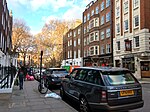The School of Philosophy and Economic Science (SPES), also operating under the names the School of Philosophy and the School of Practical Philosophy and legally named the School of Economic Science (SES), is a worldwide organisation based in London. It offers non-academic courses for adults, ranging from an introductory series called Practical Philosophy to more advanced classes. Its teachings are principally influenced by Advaita Vedanta, an orthodox philosophical system of Hinduism. It has a guru, Sri Vasudevananda Saraswati, who used the title Shankaracharya until 2017. The organisation has been the subject of controversy, especially historical child abuse that it confirmed was criminal. It has a dress code and advocates a conservative lifestyle, with traditional gender roles and sexual mores. It has been described as a cult, sect or new religious movement.The organization advertises introductory courses entitled "Practical Philosophy", "Economics with Justice" and other courses including Sanskrit language. The Practical Philosophy course involves a meditative process known as "The Exercise" and discussion of universal themes drawing on the work of European and Indian philosophers such as Plato, Marsilio Ficino, Swami Vivekananda and Adi Shankara, as well as Advaita. Those who continue involvement beyond four years mainly study Advaita; they are encouraged to marry, and are required to take up meditation, to undertake voluntary work to help with the running of the organization and to attend residential programmes.The organization's members have founded schools for the education of children in a number of countries. The organization is registered as a charity in the UK; worldwide operations register as non-profit organisations in their own countries.The organization was founded in London by Labour MP Andrew MacLaren. His successor and son, SES leader Leon MacLaren (1910-1994), a barrister introduced programs on Advaita Vedanta.According to the SES financial report for 2017, it had a total of 3173 enrolments in the UK at the close of that year. As of 2012 it had a total of around 20,000 in up to 80 branches worldwide. Operating under various names, there are branches in America, Canada, Venezuela, Australia, New Zealand, South Africa, Trinidad, Belgium, Cyprus, Greece, Holland, Malta, Spain, Ireland, Hungary, Germany, Israel and Argentina. The head of all of these branches is the SES 'Senior Tutor', MacLaren's successor, Donald Lambie, who is also a barrister.The organization's course fees are kept low to encourage recruitment; thanks to donations and wills, the organisation has a substantial cash pile and a worldwide property portfolio, including several mansions.It is the subject of the novel Shame on You by Clara Salaman.









